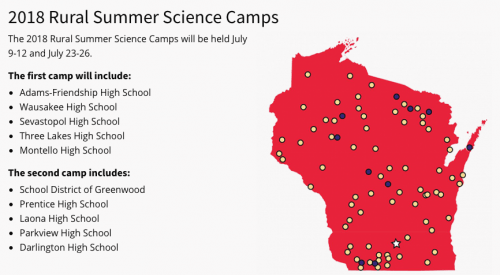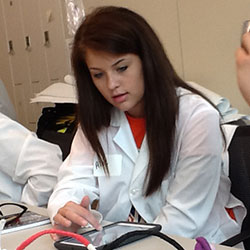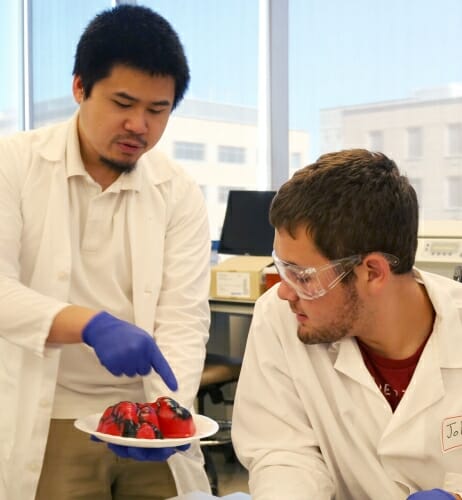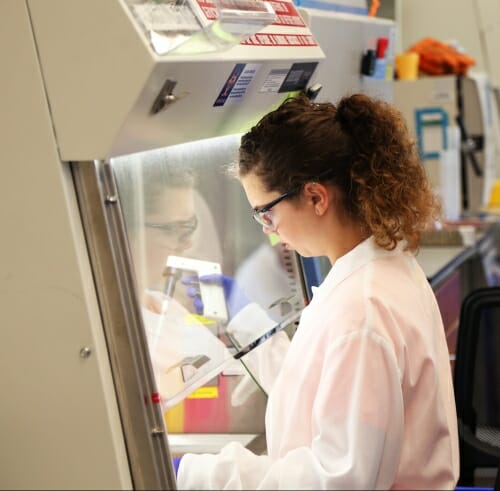Stem cell summer camp inspiring early careers in science and technology
Every summer since 2007, students from some of the smallest high schools in Wisconsin have descended on the Morgridge Institute for Research at the University of Wisconsin–Madison for some big-time scientific immersion.
The Morgridge Rural Summer Science Camp has allowed more than 500 high-academic achievers from across the state to spend a week learning from leaders in stem cell research, a field that UW–Madison helped make famous. The students arrive passionate and motivated in science, but the hope is this deep dive into real research will seal the deal for a future scientific career.

Light dots represent all participating schools since 2007; dark dots are those participating in 2018. Morgridge Institute for Research
Now, 12 years into the camp, organizers are finding it has been a difference-maker.
“We hear from student alumni and their teachers that the camp has highly influenced their academic path,” says Dan Murphy, Morgridge outreach coordinator and one of the camp organizers. “We also hear that many students chose to apply to UW–Madison after coming to the camps when they previously hadn’t intended to.”
Murphy is embarking on an in-depth survey of the camp experience this summer with the help of the Wisconsin Center for Education Research. The survey will measure impacts on both students and high-school teachers attending the camps, which are supported by private donations and are free to participants.
But lots of anecdotal information already exists on the program. Here are three stories from camp alumni now attending UW–Madison.

Alexandra Kissel’s career goal is “to earn my Ph.D. and become a research professor at a research institution similar to UW–Madison.” Photo: Morgridge Institute for Research
Alexandra Kissel
2015 graduate of Darlington High School and 2014 camp attendee. Today, Kissel is a UW–Madison senior pursuing a degree in applied mathematics, engineering and physics (AMEP) and a certificate in computer science.
“Our high school lacked the appropriate number of teachers to teach all of our classes, so many times we had one teacher teaching four or five different science courses each semester. I have always loved science, and I couldn’t wait to see what opportunities would be available at a university.
“The most valuable part of the camp was being introduced to research opportunities on campus. Before attending, I wasn’t even aware that doing research as an undergraduate was possible. Meeting the scientists was inspiring to me. I am a first-generation college student, so I was pleasantly surprised to see how easy it was to meet and talk with the successful scientists and researchers. Without this opportunity, I would have continued my naïve idea that the student and faculty populations are very separate.
“I knew immediately after the camp that I wanted to become involved in research as soon as I started at the university. I applied to an oncology lab the summer before my freshman year and started the first day of my freshman semester. I worked there for two years. I also work as an undergraduate research peer mentor, where I help students find research opportunities.
“My career goal is — and has been since high school — to earn my Ph.D. and become a research professor at a research institution similar to UW–Madison. The camp helped me confirm that the career plans from high school were the ones I wanted to pursue.”

Camper John Klopatek (right) examines a human heart model while Eric Nguyen, an alum of the Murphy Group at UW–Madison, explains how stem cells can be used to repair cardiac defects. Photo: Morgridge Institute for Research
John Klopatek
2014 graduate of Mercer High School and 2013 camper. Currently a senior at UW–Madison majoring in chemical engineering.
“The science instruction at my high school was nearly always a one-on-one learning environment. I graduated from a class of eight students, so everything we did felt like being privately tutored. The best part of my science instruction was working with my teacher, Sheri Kopka, who truly cared about each and every student and would dedicate a lot of her personal time to ensure our progress.
“The most valuable part of the camp was the opportunity to travel across the entire state and spend a full week on the UW–Madison campus. It greatly increased my interest in research. At first, it was intimidating to meet UW–Madison and Morgridge scientists, who seemed overly intelligent and hard to approach. However, after having a single conversation with them, you learn that they’re friendly, interesting and very inviting people. Every scientist I met at the camp was happy to engage in conversation with me, and ecstatic to explain their research.
“My future career goal is in the biofuels industry, with the hope of one day opening my own biofuels plant in northern Wisconsin. I strongly believe there’s an untapped market in the creation of biofuels from wood-based product waste, and that expanding this market to northern Wisconsin would significantly boost its economy.”

Hailey Enders passages stem cells at the 2015 Rural Summer Science Camp. Photo: Morgridge Institute for Research
Hailey Enders
2016 graduate of Prentice High School and 2015 camper. Currently a UW–Madison junior pursuing a degree in nursing.
“The science instruction in my high school was amazing. My teacher had a lot on his plate teaching various higher-level science classes ranging from anatomy and physiology to advanced placement biology. When I was asked to attend the camp by my teacher, I was very eager to attend since we didn’t have opportunities like this back home.
“Being from such a small town, I thought it was awesome that students were able to talk to UW–Madison and Morgridge scientists, especially for the students who were very interested in pursuing a degree in science. Spending the week at UW–Madison made me fall in love with the campus. Until that point, I didn’t have an interest in attending UW–Madison.
“The experience of attending the camp definitely ensured that I wanted to pursue a degree in science. I was unsure of what I wanted to study until last fall when I decided to start pursuing a degree in nursing. I will be working as a Certified Nursing Assistant (CNA) during the coming school year.
“The camp was the deciding factor for applying to UW–Madison. My teacher who brought me and my classmates to the camp told me he could see me going to UW–Madison, and I took his advice to heart.”
Subscribe to Wisconsin Ideas
Want more stories of the Wisconsin Idea in action? Sign-up for our monthly e-newsletter highlighting how Badgers are taking their education and research beyond the boundaries of the classroom to improve lives.




